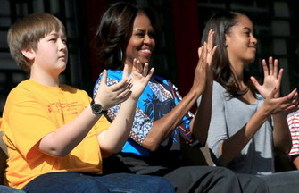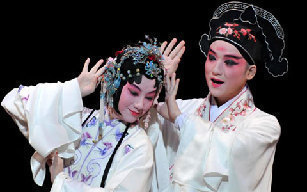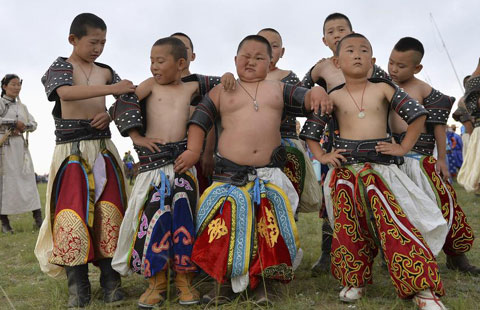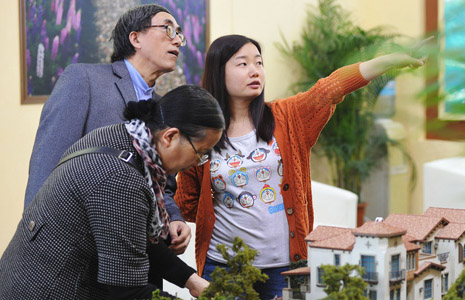Traditional Chinese operas face battle for audience
Updated: 2014-07-14 09:20
(Xinhua)
|
|||||||||||
With the free tickets handed out during the festival and intensified publicity, the recent popularity of these operas is "atypical" and only "a flash in the pan," he added.
Peng knows this too well. He organized a staging of "The Peony Pavilion" at Wuhan University in 2008. Though an instant sensation, the phenomenal success of the famous Kun Opera piece on campus has never been repeated by other traditional operas.
"Students were curious and the tickets were free thanks to a government project known as Elegant Art Goes to Campus, which explained the full attendance rate," said Peng. "When their curiosity wore off, even free tickets could not work any magic. Distractions are way too many these days."
"Traditional operas saw their heyday in the 1980s when people were hungry for traditional things after the decade-long Cultural Revolution," Yang said.
Named one of the "Five Golden Flowers" of the Huangmei Opera, Yang came to stardom in the 1980s after her study in central China's Anhui Province, where the opera genre was popular. She is now head of the Hubei Traditional Opera Art Troupe, whose repertoire includes Huangmei Opera, Chu Opera and Han Opera.
Some of the festival performances were judged and awarded prizes, which Yang saw as a good opportunity for her proteges to make a mark.
"Let this also be a festival for the young artists, who have toiled in this unlucrative business for years but remained obscure," Yang said. "Winning an award can be life-changing and encourage them to stay in the business."
According to Yang, fewer than half of the young graduates from opera academies in China stick to the profession after ten years. Salary is low because of poor ticket sales. Government subsidies for the artists' performances are meager and have to be spread out to cover all troupe employees, including those who have retired.
SURVIVE OR THRIVE?
Though prizes and awards may be life-defining for young artists, Peng said too much attention spent on coveting awards harms the arts industry.
"Award-oriented opera productions are simply too vain," Peng said. "The whole industry should focus on increasing audience size by making these traditional operas more appealing to the general public instead of pleasing the judges."
Some opera artists have managed to attract a young crowd, while many others face the threat of reduced following as old aficionados grow older and young enthusiasts are a rarity.
By giving lectures on Yue Opera to university students and making the stories more relevant to the young generation, Mao Weitao, a Yue Opera artist and head of the Zhejiang Xiaobaihua Yue Opera Troupe, is a superstar in the eyes of the young.
Related Stories
The Tales of the Purple Robe, a Classical Peking Opera 2014-07-11 15:46
Relaxed Italian fare in bustling Wan Chai 2014-07-05 11:18
Fujian's version of 'Sydney Opera House' to be built 2014-07-02 17:12
Kunqu visits schools in Zhouzhuang 2014-06-19 11:06
Famous Peking Opera singer visits Taicang 2014-06-17 11:14
Today's Top News
Flash making emperor 'alive' goes viral
US artist creates lifelike baby animals
Chinese ink paintings shine in France
Anti-virus firms set to lose approved status
Scrawny tiger at Tianjin zoo arouses concerns
Canadian couple 'steal secrets' in China
Ukraine troops seek asylum in Russia
Food scandal hurt McDonald's results
Hot Topics
Lunar probe , China growth forecasts, Emission rules get tougher, China seen through 'colored lens', International board,
Editor's Picks
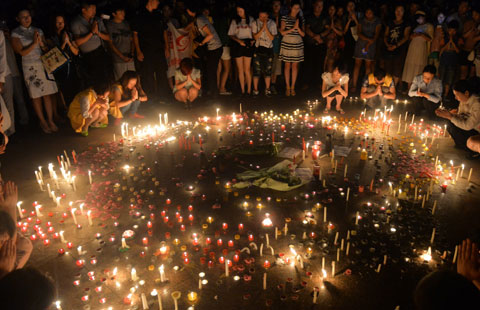
|

|

|

|

|

|
